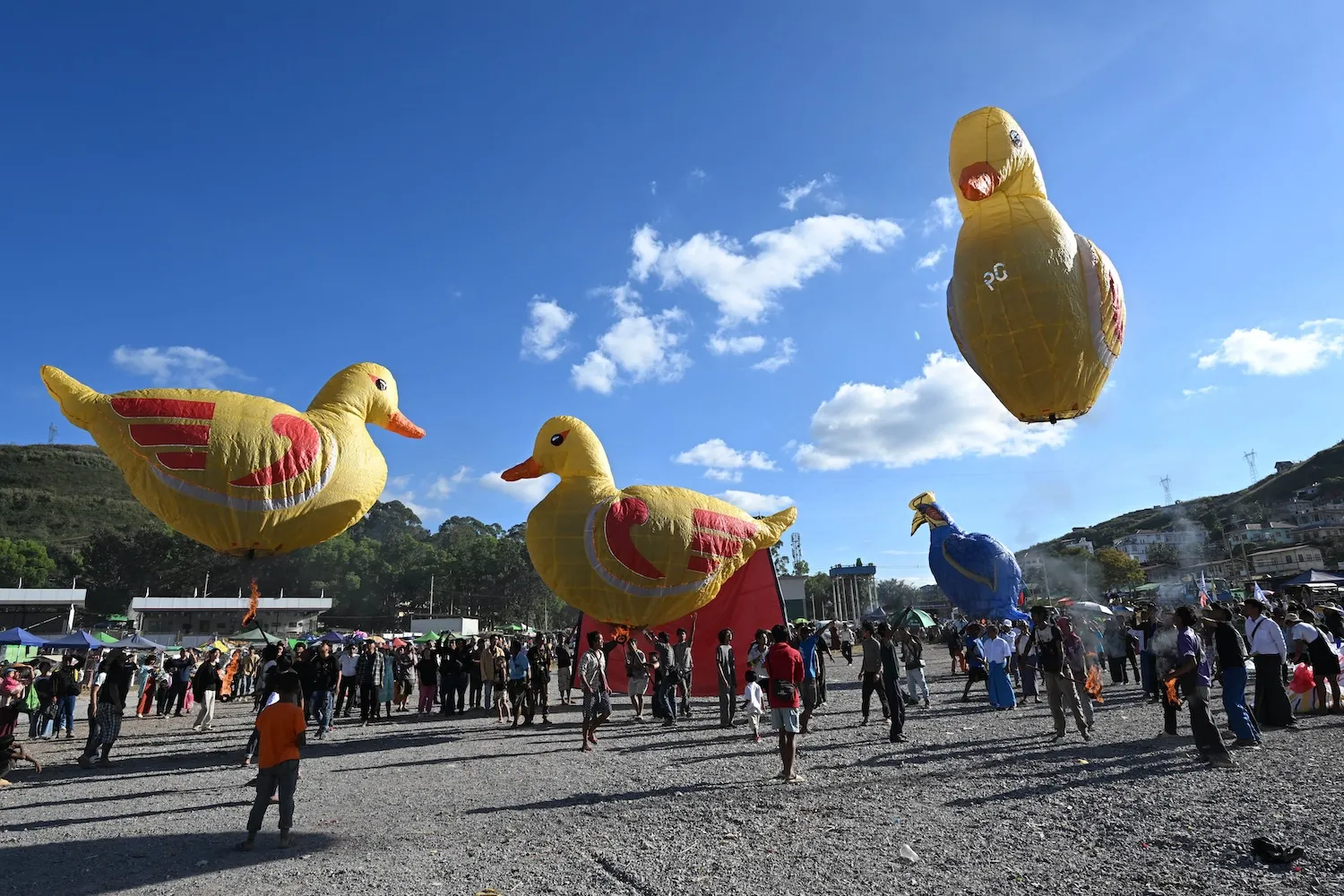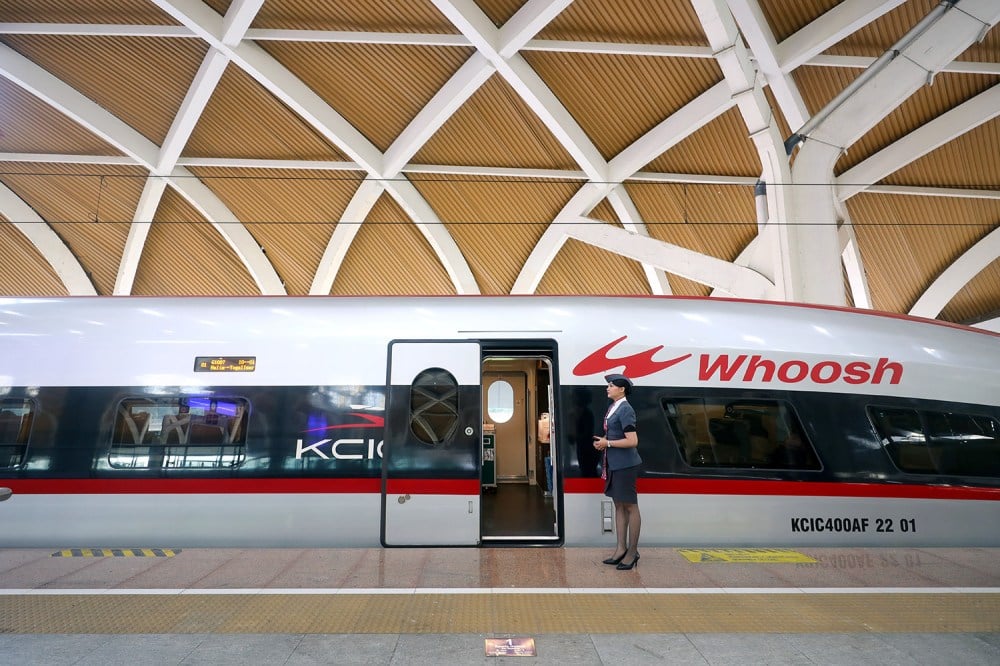Welcome to Foreign Policy’s Southeast Asia Brief.
The highlights this week: Indonesia struggles with Chinese high-speed rail debt, Myanmar’s bogus election season begins, ex-Philippine President Rodrigo Duterte appeals at the ICC, and Vietnam fortifies in the South China Sea.
Have feedback? Hit reply to let me know your thoughts.
Indonesia’s Belt and Road Railway to Nowhere
In Indonesia, a signature project of China’s Belt and Road Initiative (BRI) has fallen on hard times.
The Chinese-built and -funded high-speed railway line is struggling with debt and has become a “time bomb,” the CEO of Indonesia’s state-owned railway told members of parliament in August.
Meanwhile, the national anti-corruption agency is beginning an investigation into the project, and now it looks as if the government will have to bail it out.
Where once observers might have invoked debt-trap diplomacy as an easy explanation for what went wrong, that concept looks increasingly dubious.
Nonetheless, the mundane reality of an ambitious project that failed to live up to its hype illustrates some of the wider problems of Chinese investment in the region.
A March 2024 report on the BRI by the Sydney-based Lowy Institute found that China’s penchant for funding megaprojects vulnerable to problems, delays, and political change had meant that it had yet to deliver on $50 billion in financing.
For a period, it looked as if China had learned its lesson on scaling back investments, promoting projects with the slogan “small but beautiful.” But now BRI investments have surged again—and Indonesia’s stumbling high-speed rail project shows the risks this might bring.
The $7.2 billion project, dubbed Whoosh, kicked off in 2015, when the Indonesian government announced that China would build a high-speed rail link between the capital of Jakarta and the nearby city of Bandung and gradually extend the line to other cities. China beat Japan’s tender, and the high-speed rail joined the ranks of other Chinese investments in Indonesia.
Since the start, experts have questioned the viability of the project. Delays set in, and costs have risen to about 20 percent more than the initial estimate.
The company running the line, KCIC, still generates enough revenue to cover operations. But interest, foreign exchange losses, and depreciation have put it in the red.
The China Development Bank lent at a modest 2 percent interest on principal and 3.4 percent on overrun costs—60 percent borne by a consortium of Indonesian state-owned enterprises, or SOEs, and 40 percent by a consortium of Chinese SOEs. Hardly a debt trap—but the KCIC is still struggling.
The key problem is the number of passengers, with ticket revenue well below target. From January to October of this year, the trains served more than 5.1 million passengers. Initial studies predicted many more riders.
With the need for a bailout increasingly apparent, the question has become who is to blame and who will pay.
On whom to blame, the focus for now is on potential corruption, with a probe launched by the anti-corruption commission. A former minister has claimed that the cost per kilometer of the track reached $52 million, compared with $17 million to $18 million per kilometer in China.
Whether this claim stands up, though, is questionable. The average cost per kilometer of high-speed rail in China in fact may be $47.7 million, according to data from the Transit Costs Project.
On who will pay, it’s even more unclear. Indonesian Investment Minister Rosan Roeslani has said he’s pushing for Chinese lenders to take a haircut by extending repayment terms, cutting interest rates, and maybe converting the dollar loan to yuan, but this has yet to be confirmed. There’s also a row between the Finance Ministry and Indonesia’s state-owned holding company, Danantara—which Rosan oversees—over who will shoulder KCIC’s burden.
The issue has sparked a wider discussion in Indonesia on whether the project was ever supposed to make money in the first place.
Joko Widodo, who was Indonesia’s president when Whoosh kicked off, has argued that since the project is a public service aimed at addressing congestion, profit is not a priority. Notably, Jakarta’s bus and metro systems—the latter he broke ground on as governor—both rely heavily on subsidies. Whether this is viable for the much more expensive Whoosh, though, is dubious.
The mess—marked by overoptimism, policy muddle, and now a scramble to avoid the blame—can’t be pinned only on China.
While the temptation is to read this debacle geopolitically, it ultimately obscures what went wrong, Indonesian analyst Muhammad Zulfikar Rakhmat wrote in Asia Times last week: “China financed the steel and supplied the trains, but Indonesia designed the deal, ran the project and now owns the problem.”
Of course, Chinese companies can also be faulted for their willingness to throw weight behind a project whose risks were well-known. As the latest wave of Chinese investment rolls out, it remains to be seen if they will repeat the same mistakes.
What We’re Watching
Myanmar “election” campaign kicks off. The campaign season for Myanmar’s sham election kicked off last week.
The election will take place in two phases, according to junta leader Min Aung Hlaing, with the first phase scheduled for Dec. 28. Voting will not occur in 128 townships due to the ongoing civil war.
However, according to reporting by the Irrawaddy, nearly half of the townships listed in the second phase, scheduled for Jan. 11, are at least partly rebel-controlled. (Notably, the junta was able to conduct complete census operations for the election in only 145 of the country’s 330 townships in 2024.)
The election, such as it is, will be unfree and unfair. While 57 parties will reportedly be on the ballot, the National League for Democracy—which led the civilian government the military overthrew in 2021—remains banned.
The military-backed Union Solidarity and Development Party is expected to dominate. Meanwhile, shows of dissent are meeting with a harsh response. On Oct. 27, a director and two actors were arrested for criticizing a junta propaganda film and artists who participated in it.
The election seems aimed at trying to legitimize the junta, which has based its authority on a legally dubious state of emergency.
The election has attracted support from China, which is thought to have pushed the junta to adopt the plan, as well as India, which promised to send election observers. The Association of Southeast Asian Nations (ASEAN), however, has steered clear and declined to send observers. Indonesian Foreign Minister Sugiono explained that the bloc did not wish to legitimize the election.
Duterte’s latest ICC appeal. Former Philippine President Rodrigo Duterte is launching yet another appeal to try to prevent his trial by the International Criminal Court (ICC).
Duterte faces charges of crimes against humanity for extrajudicial killings carried out during his “war on drugs” campaign. The latest appeal, made public on Oct. 29, contests an earlier ruling by the ICC affirming its jurisdiction over Duterte.
Duterte’s legal team has argued that the court lacks jurisdiction, as it did not start a full investigation into alleged crimes in the Philippines until 2021, two years after Duterte withdrew the Philippines from the ICC.
The ICC has already dismissed other attempts by Duterte’s legal team to have the trial indefinitely suspended and have Duterte granted interim release on the grounds that he has “cognitive impairment” and is thus unfit to stand trial.
The case is being followed closely in a number of quarters. In the Philippines, it is a live political issue.
Duterte’s arrest on Philippine soil was the latest blow in the war between President Ferdinand “Bongbong” Marcos Jr. and his former Duterte allies, including Vice President Sara Duterte, Rodrigo’s daughter. But the move backfired, igniting the Duterte base and hurting Marcos’s popularity.
The implications of a case centered on the extrajudicial killings of alleged drug dealers resound beyond the Philippines. Former Thai Prime Minister Thaksin Shinawatra’s own “war on drugs” in 2003 saw some 2,000 people killed in a three-month period. U.S. President Donald Trump’s ongoing strikes on alleged drug boats in the Caribbean also draw parallels.
Journalist blocked from leaving Vietnam. The BBC is “deeply concerned” about one of its journalists in Vietnam, who has been prevented from leaving for several months, the broadcaster said last week.
The journalist is a Vietnamese national who lives and works in Thailand full time with the BBC. She returned in August to renew her passport, which Vietnamese authorities then withheld along with her ID card. She has also since been subjected to dozens of hours of questioning, according to reporting by the New York Times.
The BBC broke the news on Oct. 29, the day that Vietnamese leader To Lam met with British Prime Minister Keir Starmer during a visit to Britain.
Starmer is understood to have raised the issue with Lam during the meeting. Notably, however, this is not mentioned in the U.K. government’s official press release.
Vietnam and the United Kingdom also used the occasion to announce a comprehensive strategic partnership covering trade, security, climate action, migration, and education. This is the seventh such partnership Vietnam has launched since August 2024, when Lam took power.
Thailand-Cambodia heavy weapons withdrawal plan. Thailand and Cambodia have agreed on a three-month plan to withdraw heavy weapons from border areas, following the signing of a peace deal at the ASEAN summit in Kuala Lumpur, Malaysia, last month.
The first phase started on Nov. 1 and covers the withdrawal of rocket launchers. The second phase starts on Nov. 22 and covers all types of artillery. The last phase starts on Dec. 13 and covers all armored vehicles and tanks.
The agreement was drawn up by the Regional Border Committee, which convenes direct conversations between Thailand’s and Cambodia’s military commanders.
However, tensions remain. Various Thai military commanders expressed skepticism about whether Cambodia could be trusted to properly implement the agreement, speaking to the Nation, a Thai newspaper of a nationalist bent.
Photo of the Week

FP’s Most Read This Week
- Add This to the Canon of Great Diplomacy Books by Keith Johnson
- Will Trump’s Critical Minerals Blitz Pay Off? by Christina Lu
- What Rare Earths Are About to Cost a Lot More by Patrick Schröder
What We’re Reading
Last week, Vietnam once again saw devastating floods. Why do they keep happening? This AFP piece explores how climate change and inadequate infrastructure are contributing.
“‘When staying alive has become a hard choice, dying becomes an easy decision.’” An article by Su Chay in Myanmar Now describes the suicide of a husband and wife in Yangon and explores the increasingly desperate economic situation of the city’s inhabitants as war grinds on.
Have they learned nothing? Indonesia’s House of Representatives awarded itself a $600 million budget for 2026, just two months after rage over lavish parliamentary housing allowances sparked national riots, the Jakarta Post reports.
“Buan and her family of four sleep atop two crypts in a mausoleum.” AFP correspondent Pam Castro looks at the lives of impoverished Filipinos who make a living among the dead in Manila’s vast cemeteries.
In Focus: Vietnam Builds Up in the South China Sea
Vietnam is on track to overtake China in its efforts to reclaim land in the South China Sea. Press attention on the struggle for control of the area often focuses on China and the Philippines. However, in recent years, Vietnam has quietly accelerated its own activity.
Since 2022, Hanoi has sharply increased its island-building efforts. Vietnam has created about 3,319 acres in disputed areas in the South China Sea, 71 percent of China’s total, according to a March report by the Asia Maritime Transparency Initiative (AMTI). And more than 95 percent has been created since 2022.
The new land affords new possibilities. New harbors have been constructed, facilitating greater logistical capacity for Vietnamese security forces to operate in the area. A large airstrip has also been built on Barque Canada Reef.
So, what spurred the burst of activity? “The pattern we see with Vietnam is usually bursts of construction in response to what China does,” AMTI director Gregory Poling told Foreign Policy. He suspects a standoff with China around a strategic gas field in 2021 spurred the latest round.
Vietnam’s push to reclaim land and bolster its capacities can be tracked back to 2014, which saw a monthslong standoff between China and Vietnam over an oil rig.
Vietnam’s island-building in reaction was then fairly modest. What has changed now is “money and technology,” said Nguyen The Phuong, an expert on Vietnam’s maritime strategy. Cash has now been set aside and dredging vessels built. Vietnam has also had time to gauge China’s likely reaction, he added.
Indeed, in contrast to its regular harassment of Philippine vessels, China seems willing to keep the issue on a low simmer. “There is no evidence of China trying to interfere physically with these operations,” Poling said. China has also been quiet on the diplomatic front. He speculated that the fact that Vietnam is not a U.S. treaty ally and a wary respect for the Vietnamese military among Chinese counterparts may be contributing factors.
As for Vietnam’s interactions with the Philippines, despite the overlapping claims in the Spratly Islands, relations have been cordial. In fact, the two countries have signed a variety of maritime security agreements.
A shift of attitude from China could prove challenging for Vietnam, no matter how much land it has reclaimed. “Compared with China, Vietnam has a long way to go to match China’s deployment and the quality of its infrastructure and equipment,” Nguyen said. (Vietnam’s capacities are “far superior” to the Philippines, he added.)
Poling expects more infrastructure-building soon. What Vietnam will use its new airstrip for, and if it will build hangars suitable for maritime patrol craft or fighter jets, is a particular point of interest.
The post Indonesia’s Belt and Road Railway to Nowhere appeared first on Foreign Policy.




